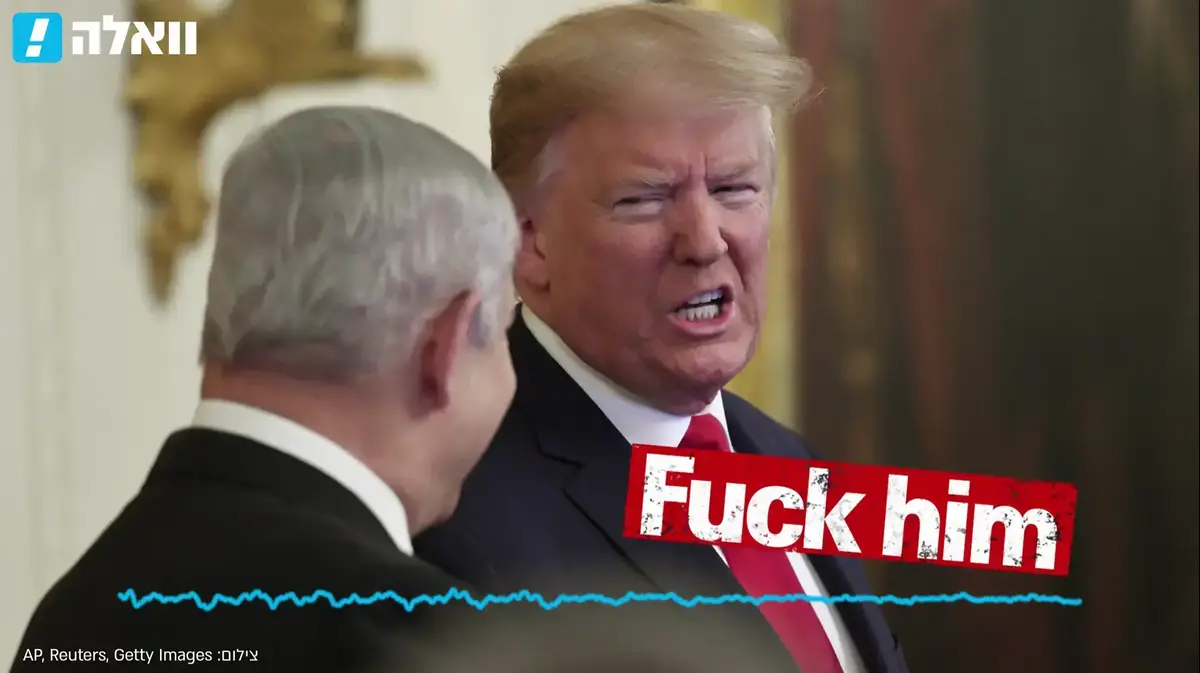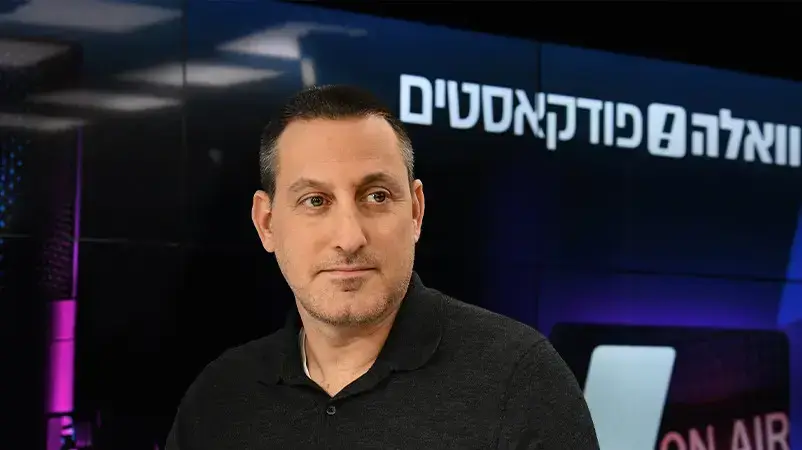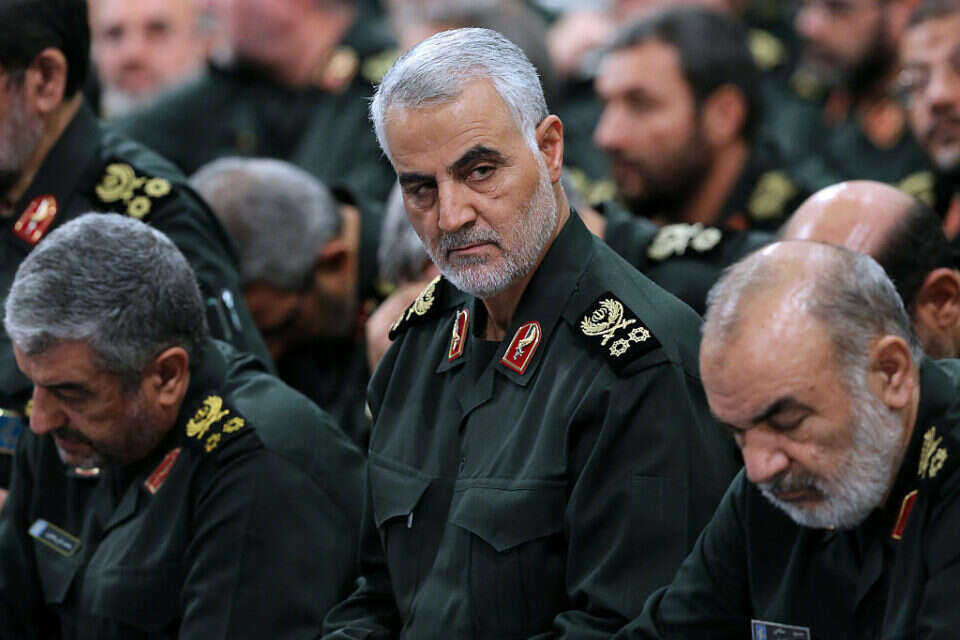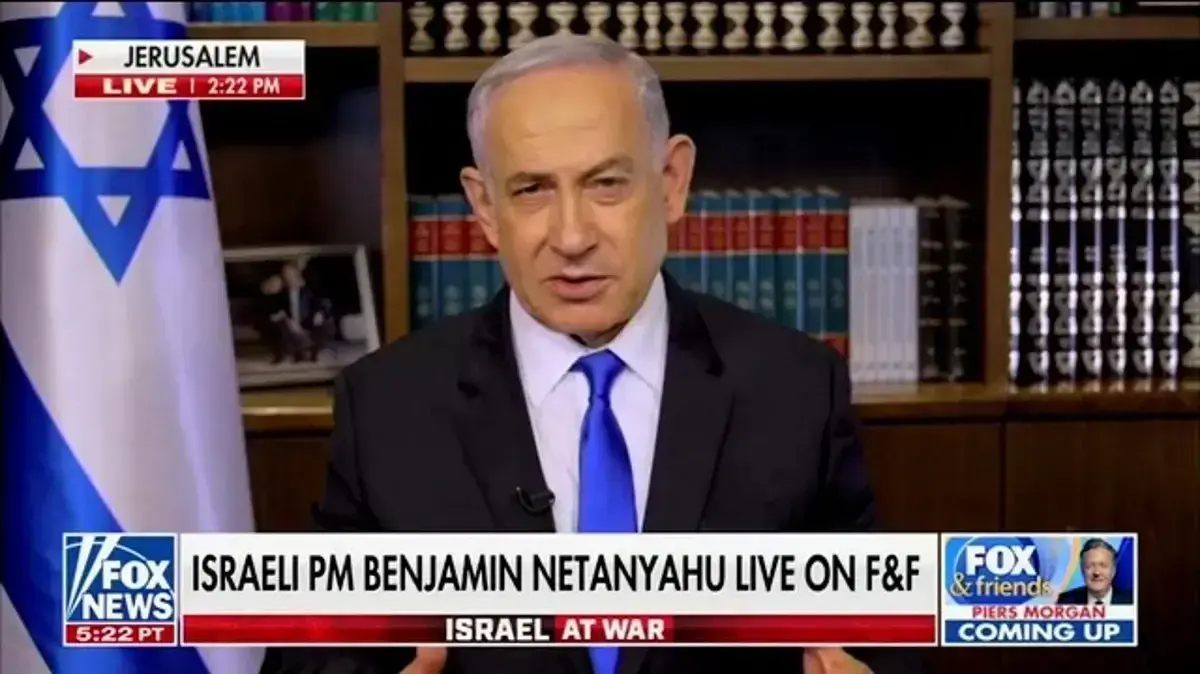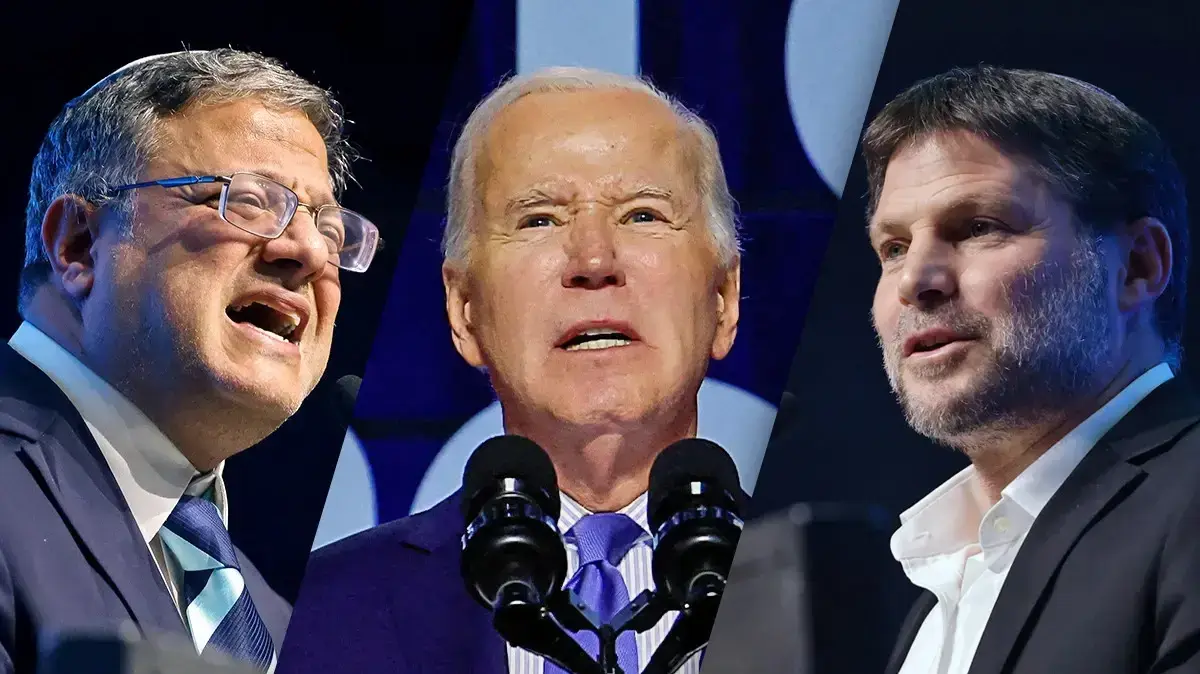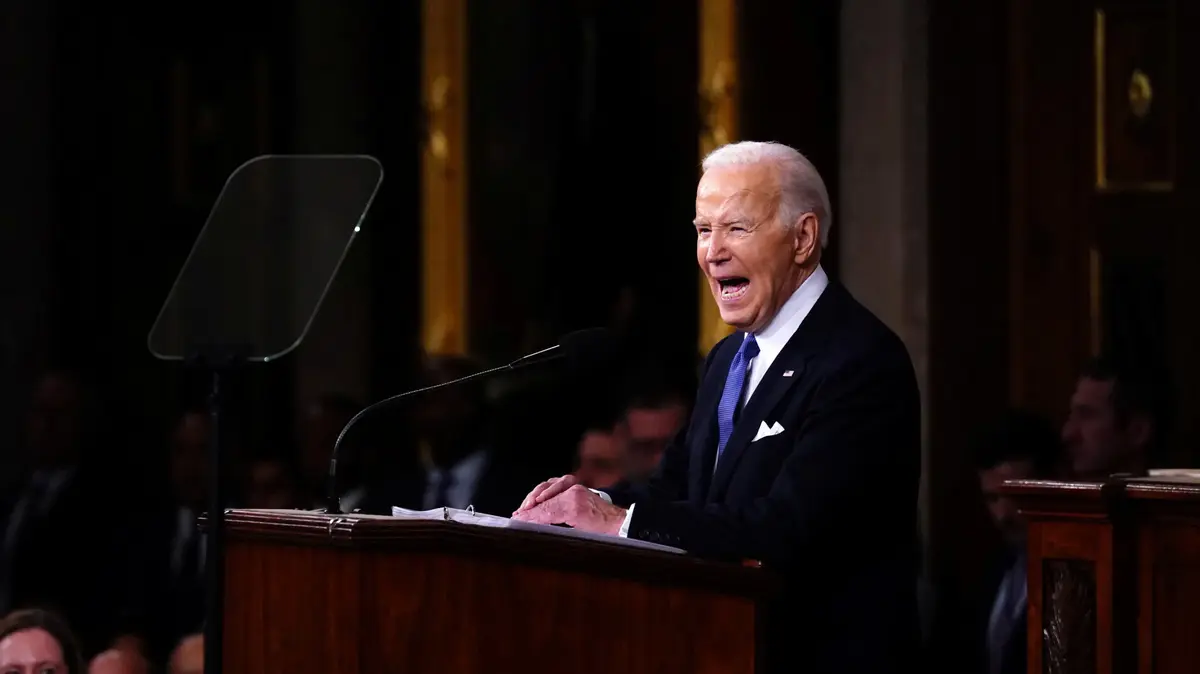Trump recordings from the curse interview are revealed: "Bibi stammered, he did not really want peace"
The former US president said one of the reasons he failed to get the "deal of the century" was that Netanyahu "never wanted" to make peace with the Palestinians. To the new book by Walla! Barak Ravid
Walla!
news
11/12/2021
Saturday, 11 December 2021, 20:24
Share on Facebook
Share on WhatsApp
Share on Twitter
Share on Email
Share on general
Comments
Comments
In the video: Trump says about Netanyahu FUCK HIM in an interview with Barak Ravid (Photo: Reuters, AP and Getty Images)
Former US President Donald Trump believes that one of the reasons he failed to reach the "deal of the century" between Israel and the Palestinians was that former Prime Minister Benjamin Netanyahu "never wanted" to make peace with the Palestinians.
Trump said this in an interview Walla! Barak Ravid in April for his new book "Trump's Peace: The Abrahamic Agreements and the Middle East Revolution". The book includes a detailed description of Trump's efforts to reach an agreement between Israel and the Palestinians and how the failure to reach such a deal led to And Sudan.
Trump presented his peace plan on January 28, 2020 in a solemn ceremony at the White House.
This was the best plan for Israel that an American president has ever presented.
However, like two of his predecessors in office - Bill Clinton and Barack Obama - Trump also came to the conclusion that Netanyahu is not serious about a two-state solution.
"I do not think Bibi ever wanted to achieve peace with the Palestinians," Trump said.
"I think he just smeared us. Smear, smear, smear"
Good to know (promoted)
Heart attack: how to prevent and what to do in case he appears
Served on behalf of Shahal
In the video: Trump explains in an interview with Barak Ravid that he is angry with Netanyahu because he was the first to congratulate Biden on his election (Photo: Reuters, AP and Getty Images)
During the 2016 election campaign, Trump has said several times that he wants to achieve the "ultimate deal" between Israel and the Palestinians. He even called her "the mother of all transactions." He expressed himself this way even though many of his associates advised him not to engage in the subject.
"Everyone told me this deal could not be achieved. Sheldon Adelson told me it was impossible," Trump said in an interview, referring to the late Jewish-American billionaire who was the biggest contributor to his election campaign and founded Israel Today to serve as Netanyahu's mouthpiece. . "There is so much hatred between the Palestinians and the Israelis. They learn from a young age to hate each other. Especially the Palestinians the Israelis. Sheldon would close great deals and he said that this deal is impossible."
Despite this, Trump has appointed his son-in-law Jared Kushner to head the White House "peace team." Kushner was initially unaware of the appointment and heard about it by chance after Trump revealed it in a closed-door briefing with members of the New York Times a few days before his inauguration. "I was thinking of the phrase 'what have you got to lose?' "I have decided that we will try to achieve peace between Israel and the Palestinians," Trump said.
Trump said in an interview that he realized quite early in his presidency that Netanyahu is a bigger obstacle to achieving peace than Palestinian President Mahmoud Abbas. "I thought he was great," Trump said of Abbas, saying they had great meetings. "He was almost like a father to me. He could not have been nicer. I thought he wanted to get a deal more than Netanyahu."
Abbas told Trump in their first meetings that he thinks a deal can be reached.
Netanyahu, on the other hand, expressed reservations about this in his talks with Trump and offered to wait and not rush into dealing with the issue.
Trump said he believes Netanyahu's opposition to the agreement with the Palestinians stemmed from the former prime minister's internal political considerations.
Trump's predecessors - Clinton and Obama - said the same thing about Netanyahu.
"My whole life is deals," the former president said.
"I'm like one big deal. That's all I do so I understand that. And after meeting Bibi for three minutes ... I stopped him in the middle of the sentence and said to him - 'Bibi, you do not want to get a deal, do you?' He started stuttering and said to me: 'Ah..ah..ah ..' and the fact is that I do not think Bibi ever wanted to get a deal with the Palestinians. "
Netanyahu and Trump (Photo: AP)
Trump undermined his efforts to reach an agreement between Israel and the Palestinians when in December 2017 he recognized Jerusalem as the capital of Israel and moved the American embassy to the city. Kushner and the White House "peace team" knew the decision would hurt their political efforts but thought it would only be from a temporary teacher who could be overcome over time. This was a miscalculation.
Trump's move has created the biggest crisis between the United States and the Palestinians in 15 years. Abbas froze almost all ties with the United States except security coordination. Trump responded by gradually cutting all U.S. economic aid to the Palestinian Authority.
Trump's decision on Jerusalem was linked to domestic politics. He was determined to fulfill his election promise and prove to his evangelical "base" that he was taking steps that no other American president had dared to take. In an interview, Trump found it difficult to explain why he took steps that benefited Netanyahu and harmed the Palestinians.Although he thought Palestinian President Abbas was more interested in peace.
One explanation for Trump was that for years the people around him told him that Israel is the one who wants peace and the Palestinians are not.
"I found that to be untrue," Trump said.
"It was the opposite of everything I had been told for years. The Palestinians were very difficult, but I do not think the Israelis on their part really wanted peace."
However, Trump accused Abbas of "being all hugs and kisses" in their meetings, but when he returned to Ramallah he spoke sharply and in an extreme way.
"Maybe he felt it was politically good for him to express himself that way," Trump said.
Cover of Barak Ravid's new book (Photo: Official website,.)
Most of Abbas' harsh statements against Trump came following the decision to recognize Jerusalem as the capital of Israel. In a speech a few weeks later, in January 2018, Abbas cursed Trump with the curse "will destroy your home." Asked if he understands the anger on the Palestinian side over his decisions, Trump said: "We were going to do something for them in another part of Jerusalem. I said then - 'Look, Israel has got something now. The next thing will go to the Palestinians. They will get something big they want.' That they knew it. "
Trump admitted in an interview that his attempt to put pressure on the Palestinians by cutting American aid to get them back to the negotiating table failed. "These are very difficult people," he said.
Trump presented his peace plan in January 2020 after a prolonged postponement resulting from the political crisis in Israel and the repeated election campaigns. The Palestinians rejected the plan outright and boycotted the White House ceremony. Trump invited for the event Netanyahu and Chairman of the "blue and white" Benny Gantz separate meetings in Washington to get both a statement in support of his plan.
Former top White House said that contrary to what seemed at the time, Netanyahu did not like the timing of the introduction of the program and feared she would harm him In the elections that were to take place a few weeks later, however, Netanyahu would have been in a situation where he would have been much more politically harmed if he had refused Trump and got into a public crisis with him before the election.
Netanyahu was also horrified when he heard that Ganz was about to have a meeting with Trump in the Oval Office and even tried to thwart this without success.
Former White House officials said Netanyahu demanded that his meeting with Trump be longer than Gantz's and that Trump's meeting with Gantz be closed to the media and no videotapes be circulated.
Ganz, for his part, feared a trap for a joint photo of him and Netanyahu with Trump.
Ganz recounted how he placed one of his men on observation at the White House gate to make sure Netanyahu was leaving the place.
It was only when this happened that the observer gave a "green light" for Gantz to head out towards the White House.
Trump said there was immediate chemistry between him and Ganz.
"I thought he was great," Trump said.
"A very impressive guy. I think it could have been much easier to get a deal with the Palestinians if Ganz was the prime minister and not Netanyahu. The Palestinians hate Netanyahu. They hate him deeply. They do not hate Ganz. This is an important variable."
"He turned the president into a flowerpot"
Netanyahu did not intend to take the Trump plan seriously to promote an agreement with the Palestinians, but to try and get a "green light" from the White House for a quick move to annex parts of the West Bank on the eve of the election. Netanyahu thought that such an annexation move would give him an overwhelming victory in the election and allow him to act to dismiss the indictments against him.
The American ambassador to Israel, David Friedman, supported such an annexation and sent messages to Netanyahu that the White House would approve it. Minutes after the White House ceremony ended, Friedman told reporters that Israel could move forward immediately with the annexation of parts of the West Bank.
But Friedman was not coordinated with the White House.
Netanyahu's speech at a White House ceremony in which he announced that he wanted to annex parts of the West Bank greatly angered Trump.
A former White House official said Netanyahu "turned the president into a flowerpot when he gave an election speech at the White House instead of reaching out to the Palestinians for peace."
When the ceremony ended and Netanyahu left the White House, Trump was nervous.
He turned to his advisers and shouted, "What the hell was that?".
"I did not tell the president that there was going to be an annexation, it would not happen"
A few hours later, when Netanyahu announced in a briefing to reporters that he intended to bring the annexation process to the government for approval within five days, Trump was furious. "When Netanyahu said let's take the whole area and start building real estate on it everywhere ... I was very angry and I stopped it because Netanyahu went too far. "I was not happy about that at all," Trump said.
That evening after Netanyahu's announcement of annexation, Kushner summoned Ambassador Friedman and rebuked him for his remarks on the issue of annexation. "David, that's really not what we agreed on. "I did not tell the president that there was going to be an annexation move and that this would not happen," Kushner told Friedman.
Netanyahu is amazed at this development.
He tried to argue and fight but 24 hours later both he and Ambassador Friedman were forced to withdraw from the annexation declarations.
"It was short in the media," Netanyahu said at the time.
Former White House officials and some of Netanyahu's advisers said it was a very difficult night and said that when Netanyahu left the White House and returned to Israel, relations between the Trump administration and the Israeli government were at an all-time low.
news
Political-political
Tags
Donald Trump
Benjamin Netanyahu
Bnei Gantz

